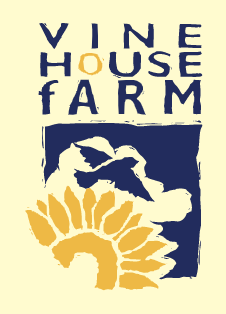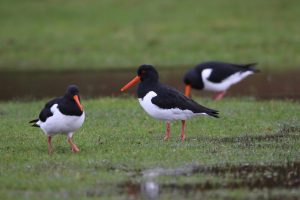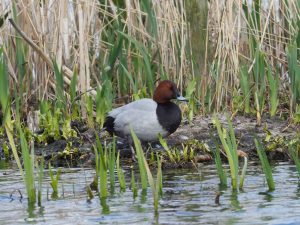
October has been a fairly average month with below average rainfall, 33mm or 1.3ins. If we divide our total annual rainfall of 530mm or 21ins by 12, our average per month is 44mm or 1.75 ins. The last 10 days have been very pleasant, dry with very little wind and allowed us to get on and lift all the potatoes and drill all of the winter wheat and, you could say, extend the summer a bit. One question we might ask ourselves at this time of year is whether we have had a good summer or not. Indeed what makes a good summer? I think the answer is that the summer has been a good one. Without going all through my temperature records, I can see that we’ve had above average temperatures, because Eddie Whitfield’s miscanthus crop has produced seed heads and it only does when the summer has been a warmer than average summer, about one year in four.

At the end of July, our potato crops were very backward, which reflected the lack of summer weather that was bestowed on us.
Warmer weather in August and September however brought the crops on to be an above average yield and of excellent quality. Good enough to win the best white potatoes and best red potatoes at the Deepings Ploughing match out of about 25 entries and these are the potatoes we sell in the farm shop. The Deepings Ploughing match is held on the last Saturday in October every year. It is well supported with over 100 ploughing entries this year, as well as all the produce entries.
Our potatoes are now all safely in store and we will trickle them out between now and next June. The price is expected to go up, as it seems that nationally there is a below average crop. During late August, and early September, we were direct drilling cover crops into fields that we had just harvested. Direct drilling means we don’t have to work the land; a special drill makes a slot in hard soil and also covers the seed. We grow a variety of cover crops to condition the soil and take up nutrients, because by continually cultivating the soil we are ruining it. The best soil on the farm is on the dyke brinks or under the hedgerows, areas that never get disturbed.
When we had grass and crops the soil was in better condition as it was rested for a few years, when down to grass. It was also fertilised by the livestock but then came chemicals, both fertiliser and sprays. Crops paid more than livestock so the livestock was dropped.
When the soil is ploughed and left overwinter – which is the traditional way of preparation for a spring crop – nutrients such as nitrogen can leach out of the soil. Cover crops will capture the nitrogen and its roots will make drainage channels in the soil. Some cover crops breakup the top two inches of the soil, whilst other ones break it up deeper down. The next crop to be direct drilled into the cover crops will be spring barley.
Another reason for the use of cover crops is to prevent the appearance of blackgrass, which requires the soil to be moved to germinate and remains viable in the soil for four years. We will have a lot less blackgrass seeds on those fields we direct drilled with a cover crop last year. There was also an added bonus – the cover crops we drilled after harvest 2015 were full of wildlife this spring.


Our summer visiting birds have now migrated south, although the Swallows stayed a few more days than usual.
This was possibly due to the warmer weather, as the last ones I saw around here were on October 5th. Since then we have had easterly winds which have encouraged the birds that fly South and West in the autumn to cross the North Sea, so some of our winter visitors have arrived early and also there have been other unusual birds from Russia and Siberia arriving on the east coast.
At least four pairs of our Barn Owls have had second broods. I went to one pair, expecting to find a brood of four and found there were seven; the eldest is due to fly in about a week. The next box I visited held six youngsters, the next one I found five. So from this I presume vole numbers have increased during the summer and that will explain why we haven’t seen any Barn Owls flying during the day. This will not be the case nationwide, as I know voles have not been so plentiful elsewhere. In some parts Barn Owls only started breeding in late June.
Our House Sparrows have had a good year; they are eating a lot of canary seed and also red millet. They have ventured round the back of the yard to where we have red millet on our feeding station – which can be seen on our live feed on our website.
I was pleased to see a flock of 500 Golden Plover with 400 Lapwings in fields to the West side of the Deeping bypass. This is more than usual but still less than about 15 years ago. If you’d like to see them they are by the two laybys at the Spalding end of the bypass but you’ll have to use binoculars as they seem to blend in with the soil very well.
A lot of conservation work has been going on around the farm; all our flower meadows and flower margins have been mown and baled so we now have a lot of flower meadow hay for sale in round bales. We do this most years, as by taking a crop off the field and not applying any fertiliser the ground will get less fertile, which will benefit the flowers.
In March this year we landscaped two fields near the Baston Fen Nature Reserve to provide a Lapwing friendly environment. They are designed so that the furrows will always hold water and so be attractive to breeding Lapwings, Redshanks and Oystercatchers. However bulrushes have moved in, so we have been pulling the small bulrush plants out. There is quite a lot more to do so if anyone fancies a bit of bulrush pulling I would welcome the help. You will need a pair of wellingtons and a garden trowel.
Lincolnshire Wildlife Trust Coffee Morning 12th November
The South Holland branch of the Lincolnshire Wildlife Trust has their annual coffee morning on Saturday 12th November at Pinchbeck Village Hall at 10am. It will be opened by Robin Page, Chairman of the Countryside Restoration Trust, who will be giving a short talk.
Come along for raffles, veg, cake, bulbs and bird seed!



